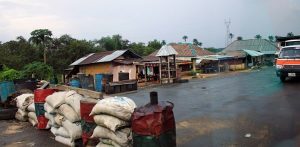- As 28.14m people threatened with unemployment
Ben Eguzozie
After three quarters of tepid growth of less than one percent, Nigeria’s trade sector, the second largest employer of labour, which has been in recession since Q2 of 2019, has suffered further decline, due to the closure of the nation’s land borders, a study by the Africa programme at Chatham House has revealed.
The trade sector in the Nigerian national accounts, according to Q3 of 2019 figures by the National Bureau of Statistics (NBS) is the second-largest employer of labour, putting 14 percent of Nigeria’s population to work (that is 28.14 million of 201 million people), and is also the second-largest contributor to GDP, where it makes up 15.23 percent of GDP after agriculture’s 48 percent.
Leena Hoffmann (Ph.D), an associate fellow at the Africa programme at Chatham House, and a technical advisor on food security and agricultural policy to the Permanent Inter-State Committee for Drought Control in the Sahel. She undertook work on informal trade at the (Nigeria’s) borders, which points to a significant impact on informal trade if a total closure of the border was to be enforced.
“The Trade sub-sector has suffered a significant decline in its fortunes recently with the FX policies of the last five years, as well as inadequate transportation infrastructure which makes it difficult for investments to be sustained in the sector, and for it to grow. After three quarters of tepid growth of less than 1%, it finally slipped into another contraction in Q2 2019 for the third time in six cumulative quarters, recording growth of -0.25%. With the added pressure on the sector from the closure of the border, it is no surprise that the growth of the sub-sector has been further constrained,” the study said.
Data by the NBS of Q3 2019 GDP results showed a marginal growth of 2.28%, but the festering issue of the border closure has clearly had an effect on the numbers, said SB Morgen.
Hoffmann observed the strong complementarity in basic staple foods, pastoral production bases and manufacturing between Nigerian and her neighbours, meaning that an enforced closure of the border would have a material impact on the quality of life and poverty levels of those living in the border area and within the wider country.
“However, that is only to the extent that the border closure can be realistically enforced given the 4,047 km of land borders and 46 cross-border markets which Nigerian officials will have a hard time patrolling,” the report said.
It said, given the relative importance of Agriculture and Trade in the GDP and employment numbers, it is fair to say that a significant part of the ‘measured’ national economy involves the production of crops and livestock and their distribution to demand centres for purchase and consumption. Measurement of the Trade component of the National Accounts does not involve segmenting domestic trade and international/export trade, but some inferences can be drawn.
The Chatham House Africa programme report said Nigeria’s crude oil and gas exports make up about 30 percent of export GDP, leaving the remaining 70 percent to manufactured products and primary agricultural commodities. While a significant quantity of non-oil exports will leave by sea ports, quite a bit leaves by the land borders as well. With the borders shut, the movement of these goods across the land borders become quite constrained. Likewise, traders who rely on imports across land borders to source goods for distribution within Nigeria are having a very difficult time.









